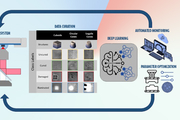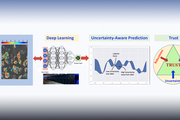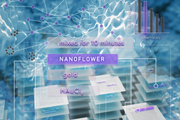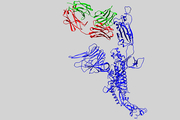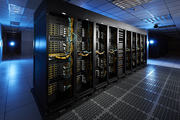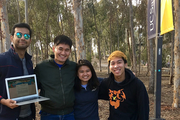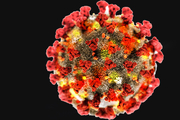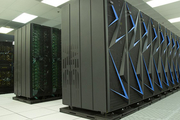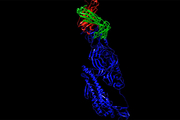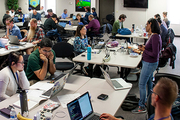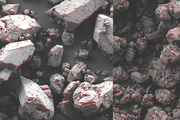Did you know we have a monthly newsletter? View past volumes and subscribe.
COVID-19 HPC Consortium reflects on past year
April 1, 2021 -
COVID-19 HPC Consortium scientists and stakeholders met virtually on March 23 to mark the consortium’s one-year anniversary, discussing the progress of research projects and the need to pursue a broader organization to mobilize supercomputing access for future crises. The White House announced the launch of the public-private consortium, which provides COVID-19 researchers with free access to...
CASC research in machine learning robustness debuts at AAAI conference
Feb. 10, 2021 -
LLNL’s Center for Applied Scientific Computing (CASC) has steadily grown its reputation in the artificial intelligence (AI)/machine learning (ML) community—a trend continued by three papers accepted at the 35th AAAI Conference on Artificial Intelligence, held virtually on February 2–9, 2021. Computer scientists Jayaraman Thiagarajan, Rushil Anirudh, Bhavya Kailkhura, and Peer-Timo Bremer led...
Model for COVID-19 drug discovery a Gordon Bell finalist
Nov. 17, 2020 -
A machine learning model developed by a team of LLNL scientists to aid in COVID-19 drug discovery efforts is a finalist for the Gordon Bell Special Prize for High Performance Computing-Based COVID-19 Research. Using Sierra, the world’s third fastest supercomputer, LLNL scientists produced a more accurate and efficient generative model to enable COVID-19 researchers to produce novel compounds...
Advancing healthcare with data science (VIDEO)
Aug. 3, 2020 -
This video provides an overview of projects in which data scientists work with domain scientists to address major challenges in healthcare. To help fight the COVID-19 pandemic, researchers are developing computer models to search for potential antibody and antiviral drug treatments, sharing a data portal with scientists and the general public, and analyzing drug compounds via a novel text...
Machine learning model may perfect 3D nanoprinting
July 29, 2020 -
Two-photon lithography (TPL)—a widely used 3D nanoprinting technique that uses laser light to create 3D objects—has shown promise in research applications but has yet to achieve widespread industry acceptance due to limitations on large-scale part production and time-intensive setup. LLNL scientists and collaborators turned to machine learning to address two key barriers to industrialization...
LLNL papers accepted into prestigious conference
July 9, 2020 -
Two papers featuring LLNL scientists were accepted in the 2020 International Conference on Machine Learning (ICML), one of the world’s premier conferences of its kind. Read more at LLNL News.
Lockdown doesn’t hinder annual Data Science Challenge
June 26, 2020 -
Due to the COVID-19 pandemic and shelter-in-place restrictions, this year’s Data Science Challenge with the University of California, Merced was an all-virtual offering. The two-week challenge involved 21 UC Merced students who worked from their homes through video conferencing and chat programs to develop machine learning models capable of differentiating potentially explosive materials from...
AI identifies change in microstructure in aging materials
May 26, 2020 -
LLNL scientists have taken a step forward in the design of future materials with improved performance by analyzing its microstructure using AI. The work recently appeared online in the journal Computational Materials Science. Read more at LLNL News.
COVID-19 research goes public through new portal
May 18, 2020 -
A new online data portal is making available to the public a wealth of data LLNL scientists have gathered from their ongoing COVID-19 molecular design projects, particularly the computer-based “virtual” screening of small molecules and designed antibodies for interactions with the SARS-CoV-2 virus for drug design purposes. The portal houses a wealth of data LLNL scientists have gathered from...
Building knowledge and insights using machine learning of scientific articles
May 5, 2020 -
Nanomaterials are widely used at LLNL and in industry for many applications from catalysis to optics to additive manufacturing. The combination of nanomaterials’ shape, size, and composition can impart unique optical, electrical, mechanical, or catalytic properties needed for a specific application. However, synthesizing a specific nanomaterial and scaling up its production is often...
New ML platform generates novel COVID-19 antibody sequences for experimental testing
May 1, 2020 -
LLNL researchers have identified an initial set of therapeutic antibody sequences, designed in a few weeks using machine learning and supercomputing, aimed at binding and neutralizing SARS-CoV-2, the virus that causes COVID-19. The research team is performing experimental testing on the chosen antibody designs. Read more at LLNL News.
Upgrades for LLNL supercomputer from AMD, Penguin Computing aid COVID-19 research
April 21, 2020 -
Under a new agreement, AMD will supply upgraded graphics accelerators for LLNL’s Corona supercomputing cluster, expected to nearly double the system’s peak compute power. The system will be used by scientists through the public/private COVID-19 HPC Consortium, and by LLNL researchers, who are working on discovering potential antibodies and anti-viral compounds for SARS-CoV-2, the virus that...
New partnership results in increased access to compelling 'real world data'
April 21, 2020 -
Through a new partnership between the UC San Diego Library, Halıcıoğlu Data Science Institute (HDSI), and LLNL's Data Science Institute, UCSD library patrons can now access and analyze two new “real world” data sets from LLNL. The Open Data Initiative collection shares some of LLNL’s challenging and unique data sets, which range in complexity from large-scale, domain-specific simulated data...
Using data to build a secure future (PODCAST)
April 21, 2020 -
On the Hidden in Plain Sight podcast, LLNL director Bill Goldstein explains how the Lab crunches data to shape the future. Listen at Mission.org.
LLNL creates web resources to aid in fight against COVID-19
March 30, 2020 -
LLNL is fully committed to helping protect the U.S. from COVID-19 and to speed the recovery of those affected. As a world-class research institute, we have considerable infrastructure, unique research capabilities and a dedicated team of scientists and engineers supporting the fight against the COVID-19 pandemic. Our current COVID-19 research and response activities are focused on four broad...
New partnership to unleash U.S. supercomputing resources in the fight against COVID-19
March 26, 2020 -
The White House announced the launch of the COVID-19 High Performance Computing Consortium to provide COVID-19 researchers worldwide with access to the world’s most powerful high performance computing resources that can significantly advance the pace of scientific discovery in the fight to stop the virus. Read more at LLNL News.
Lab antibody, anti-viral research aids COVID-19 response
March 26, 2020 -
LLNL scientists are contributing to the global fight against COVID-19 by combining artificial intelligence/machine learning, bioinformatics and supercomputing to help discover candidates for new antibodies and pharmaceutical drugs to combat the disease. Armed with the virus’ predicted 3D structure and a few antibodies known to bind and neutralize SARS, an LLNL team led by Daniel Faissol and...
DSI sponsors LLNL hackathon
Feb. 18, 2020 -
Since 2012, Lawrence Livermore National Laboratory’s (LLNL’s) Computing directorate has held hackathons three times a year. These spring, summer, and fall events are scheduled over 24 hours and invite software teams to work on new ideas, programming languages, open-source tools, or project tasks. Exploration and experimentation are highly encouraged, and “It’s OK to fail” is the event mantra...
Machine learning accelerates high-performance materials development
Feb. 13, 2020 -
Lawrence Livermore National Laboratory (LLNL) and its partners rely on timely development and deployment of diverse materials to support a variety of national security missions. However, materials development and deployment can take many years from initial discovery of a new material to deployment at scale. Now, an interdisciplinary team of LLNL researchers from the Physical and Life Sciences...
Department of Energy researchers share data management strategies at first-ever “Data Day”
Nov. 11, 2019 -
It’s become something of a mantra of the digital age: Data is the new currency. Especially in science, where it’s hard to find a single project that doesn’t involve generating or consuming massive amounts of data.
In light of the growing awareness of the critical importance of data management across the Department of Energy complex, more than 100 researchers from DOE national laboratories...




